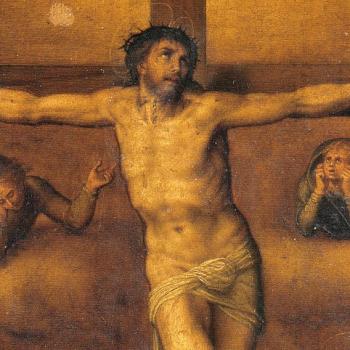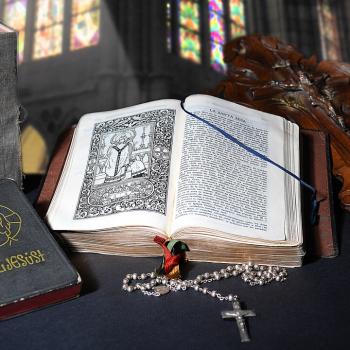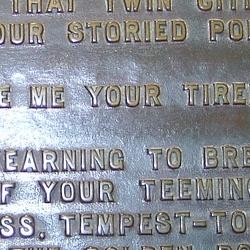
Much there is, dear reader, to admire and agree with in Dr.* James White’s recent presentation on the singularity of the Gospel. We disagree on how “the Gospel” is to be defined: He would say it is justification by faith alone; I say that that is a false doctrine and exists nowhere in Sacred Scripture. It exists only if you add the extraneous word “alone” to Romans 3:28 and ignore James 2:24. But on the whole, Dr.* White’s talk focused on the errors of secularism—in particular, the erroneous belief that truth is relative or multiple, and that it is wrong and “judgmental” to point out error. There, he and I agree. That said, if Dr.* White believes that St. Paul’s words in Galatians 1 are his most direct, I would have to ask him whether he has read Ephesians 4 of late. Paul’s words there about the singularity of the Church are just as much without compromise. Paul says there is one Church, not 48,500. (I discuss this figure below.)
Some Exegesis for Dr.* White
Here is the relevant text in Ephesians 4:
I therefore, the prisoner of the Lord, beseech you that ye walk worthy of the vocation wherewith ye are called, with all lowliness and meekness, with longsuffering, forbearing one another in love; endeavouring to keep the unity of the Spirit in the bond of peace. There is one body, and one Spirit, even as ye are called in one hope of your calling; one Lord, one faith, one baptism one God and Father of all, who is above all, and through all, and in you all. (Eph. 4:1-6)
That is certainly direct. If in Galatians 1:7 St. Paul says that there is not any other gospel, in Ephesians he doubles down. Not only is there not any other gospel, but there is not any other Spirit, there is not any other hope, there is not any other God, there is not any other faith, there is not any other baptism, and there is not any other Church. When I was a Protestant, I was aware of the Catholic “one Church” interpretation of this passage. But when I looked at it I would protest, thus: But the phrase “one Church” is not there!
Only, I was wrong: By “one body” Paul means “one Church.” If you are in doubt, you need only look a few chapters earlier, where he says that God “hath put all things under [Christ’s] feet and gave him to be the head over all things to the church, which is his body” (Eph. 1:22-23a). Likewise in his letter to the Colossians, Paul says that Christ “is the head of the body, the Church” (Col. 1:18). Even more surprisingly, Paul goes on, in verse 24 of Colossians 1, to say, “[I] fill up that which is behind of the afflictions of Christ in my flesh for his body’s sake, which is the church.” As belonging to the Church is necessary to lead a life worthy of one’s calling in Christ, so the Church makes me a partaker of “Christ’s afflictions for the sake of his body.” Not only are Christ’s body and the Church the same, but my body is not to be separated from the Church either.
The Church is the body of Christ, and the body of Christ is not divided. “One body” (en soma; ἓν σῶμα) Paul says in Ephesians 4. He uses the same Greek word in Ephesians 1 to identify the “one body” with the Church: te ekklesia, etis esten to soma (τῇ ἐκκλησίᾳ, ἥτις ἐστὶν τὸ σῶμα), “the Church, which is the body.” And again in Colossians 1:18: tou somatos tes ekklesias (τοῦ σώματος τῆς ἐκκλησίας), “the body the Church.” And finally in Colossians 1:24: tou somatos autou, o estin e ekklesia (τοῦ σώματος αὐτοῦ, ὅ ἐστιν ἡ ἐκκλησία), “his own [i.e, Christ’s] body, the Church.” Each time, Paul uses the same word, σῶμα (body) to signify ἐκκλησίᾳ (the Church). Thus when he says in Ephesians 4 that there is “one body,” what he means is that there is one Church.
Reformed Christians have a very high doctrine of the Gospel (albeit a false one), but not a very high doctrine of the Church. The reason that is troubling is because Paul claims no less an exclusivity for the Church than he does for the Gospel. I am used to hearing Protestant apologists take a page out of Plato and say things like, “There is an invisible Church which is manifest in local bodies.” But St. Paul doesn’t use the plural, he uses the singular: body. I never hear Protestants say things like, “There is an invisible Gospel which is manifest in local books.” Neither do they say, “Christ has an invisible body that is manifest in local limbs.” Neither, finally, do they say, “Christ has an invisible bride who is manifest in local women.” But there is an odd need, among Protestants, to attempt to create the false dichotomy that rends Christ from His Church.
Thus when Protestants convert to Catholicism, Dr.* White oft will say, “Their conversion is to a Church, and not to Christ.” He said it most recently here, just this very week, in his hyperbolic “response” (more of a tantrum) to the conversion of Jason Reed.
Dr.* White, there is no difference. If you want to say that the Gospel has an exclusivity to it, you are right and I am for you; but you can not claim anything less for the Church. Paul didn’t. It is inconsistent for you to preach the Gospel’s exclusivity while you remain in a protest that has resulted in 48,500 different sects. That is not what Christ meant when he prayed ἵνα πάντες ἓν ὦσιν, “that they may all be one” (John 17:21). That is not what Paul meant when he said that we should be of one mind (τῷ αὐτῷ νοῒ ) and one judgment (τῇ αὐτῇ γνώμῃ; 1 Cor. 1:10). If you claim an exclusivity for the Gospel, don’t be shocked when Catholics claim an exclusivity for the Church. Who’s really being inconsistent?
Christ has one body. It is visible. And it is manifest in one Church.
The Law of Sectarian Growth
Now, as to how I reach the number 48,500 as the current number of Protestant sects. The World Christian Encyclopedia sets the number at 33,000. (And yes, I’ve heard all of Dr.* White’s attempts to deconstruct this number; frankly, they fall thin.) But the publication date of this edition (ed., Barrett, Kurian, & Johnson) is January 18, 2001. Unless Dr.* White wants to tell me that the number of Protestant sects has remained existentially fixed since 2001, the number must be greater today. But by how much?
I believe it reasonable to surmise that, rather than the number of sects growing at a steady rate, it continues to grow exponentially, according to the Law of Exponential Growth. The task, then, is to discover how often the number of Protestant sects doubles.
That is, in truth, a relatively easy process of starting with 1 and continuing to double it until you reach a number approximating 33,000. Starting with 1, you next proceed to 2, then 4, then 8, then 16, then 32, and so forth. If you continue this way fifteen times, you’ll reach the number 32,768.
Now, if we subtract 2001 (the year of the publication of the World Christian Encyclopedia) from 1517 (the year of the 95 Theses), we get the number 484. Divided by 15 (the number of exponential increases needed to reach 32,768 sects), we find that the number of Protestant sects doubles about every 32 years. We may trace the growth in Protestant sects thus:
1517, 1 sect
1549, 2 sects
1581, 4 sects
1613, 8 sects
1645, 16 sects
1677, 32 sects
1709, 64 sects
1741, 128 sects
1773, 256 sects
1805, 512 sects
1837, 1024 sects
1869, 2048 sects
1901, 4096 sects
1933, 8192 sects
1965, 16,384 sects
1997, 32,768 sects.
As it turns out, the World Christian Encyclopedia was a few years behind. But since we can assume that the number doubles every 32 years, that would mean that, by 2029, the number of Protestant sects would reach a gargantuan 65,536. In 2013, we are half way there. If between 1997 and 2029 the number of sects will increase by 32,768, that’s an increase of about 1024 a year. By the end of 2012, the number had reached 48,128. With an increase this year of about 2.8 sects a day, the number currently stands (as of May 14) at 48,503.
Dr.* White, is that what Christ intended?
I do not lay all the blame for this upon sola scriptura. (Pray note that, Dr.* White!) But I do blame the the most basic flaw in Protestantism: private judgment; or, the idea that you may follow no other authority than that of your own intellect to discern the meaning of Scripture. However much Protestants try to use rhetoric to disguise it otherwise, that is what they do. And that is a foundation of sand. It is a foundation that divides Christians, in an endless exponential division, from the one Christ and his one body. It is not the foundation I want to stand upon. I choose to stand upon the rock of Christ, and His body the Church, and the Holy Spirit who guides the Magisterium into all truth (John 16:13).
Note: Dr.* White does not discuss this text anywhere in The Roman Catholic Controversy, nor (as far as I can tell) does he discuss it in even one blog article. I began with a search for “Ephesians 4” and “Ephesians Four” and found many articles that mentioned Ephesians, but not chapter 4. So then I ran a search for “Ephesians Roman Catholicism,” and found a good deal of articles citing Ephesians 2 instead. Where Dr.* White does mention Ephesians 4, it is always in some different context than exegeting the “one Church” passage. If I have overlooked something, and Dr.* White has exegeted this text, I would be grateful to be directed to it. Else, I shall be left to conclude that Ephesians 4:1-6 renders him mute.
***
If you like the content on this blog, your generous gift to the author helps to keep it active. I remember all my supporters in my Mass intentions each week.












